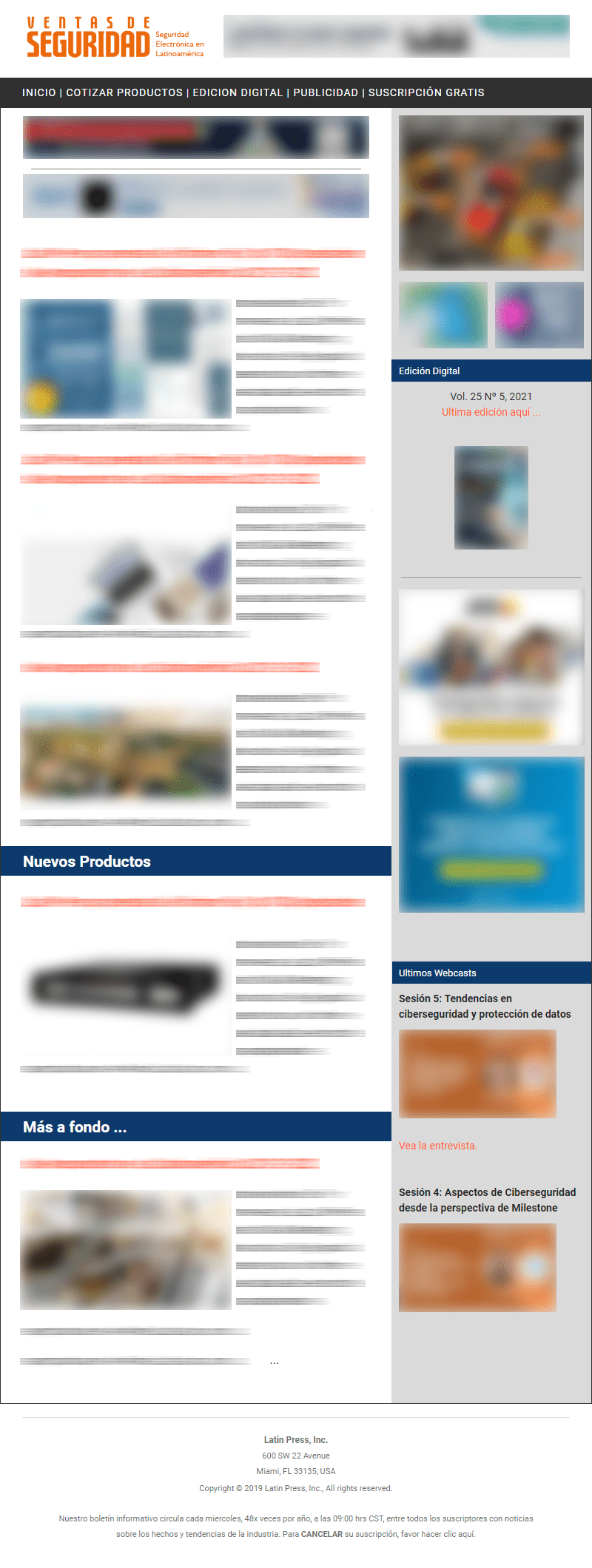 Second part of this analysis about the current forms of training and knowledge existing in our industry.
Second part of this analysis about the current forms of training and knowledge existing in our industry.
by Eng. Germán Alexis Cortés H.*
Learning to Learn: Are the fundamental bases and principles of your knowledge sufficient to grasp and understand everything you are taught? Think about when you attend mini courses, conferences or seminars, organized by manufacturers, distributors or integrators of electronic security equipment in our environment.
In this technical guild -as in any other-, we must have three (3) types of knowledge, learned at very different times and places:
1. The generic and theoretical concepts of their profession (Operator, Technician, Engineer, Salesman, Manager), which we learned after basic secondary training or baccalaureate.
2. The bases and foundations of your technical specialty (Electronic Security, Digital Communications, Electronics), which we learned in universities, academies or impartial associations that specialize in the subject.
3. The specific characteristics of the products and solutions, what each brand or distributor teaches us for a commercial purpose. 90% of the digital information on the Internet belongs to this segment, which presumes that readers have already gone through the previous two segments.
Think about whether the amount of knowledge you have, has gone through those times and places, or intends to obtain them all AGR (Here, Free and Fast), that is, in an easy and erroneous way, as commonly happens.
It's kind of like pretending to be mechanical engineers by attending only 2 Toyota seminars, does it seem possible to you? And what would happen, when we have to work with Fiat? In our environment there are (engineers, technicians, salespeople, advisors and managers) who pretend to know all the answers, because they attended a half-day course, with lunch included; or worse, they boast of having attended a direct factory training where their company spent 3 thousand dollars and have not yet read the manuals they were going to bring.
I do not mean to say that the trainings of the factories and distributors are bad, I think they are an excellent complement to keep us updated; however, pretending to be professional in this way is not the best way. You have to truly learn and be humble in that sense.... there will always be something new to learn.
Business courses vs. academic courses
1. The first thing that can differentiate them is their cost. The vast majority of commercial courses are worth very little or are free, since they have a special purpose: to increase the sales of the brands they represent, showing new products and teaching potential buyers their benefits.
Let's examine that the information given in these courses is biased to the characteristics of the products of the represented or sponsored brand. It is obvious that no one in these sessions is going to talk about the wonders of the competing company, nor about the shortcomings of their own products. We must understand it, it would be absurd and illogical if it were not so. Business courses belong to knowledge type 3.
The engineers who present these conferences, trust that the attendees know very well the fundamentals and bases of the different systems; then they can focus on the innovations, differences and benefits of their brand.
The reality is very different in our Latin guild: few attendees take advantage of these conferences, because the vast majority are lost in the sea of knowledge and although they know what they are talking about, they have immense gaps in the bases of their knowledge. They do not ask or ask for clarification, because of their insecurity and conceptual gaps. They just surf their cell phone and eat. And manufacturers, believing that they will increase their sales!
2. The second (academic courses) are taught by impartial or neutral companies, such as academies, associations and universities; non-commercial purposes. Consequently, they have a higher value, due to the costs of instructors, planning, methods and certification.
Academic courses usually follow a logical sequence of learning, divide topics into segments or modules and the assistant is aware of their progress. They inform you of the prerequisites of knowledge, which you must meet to correctly access the information that will be taught and evaluate you permanently, to keep track of your progress in training. It is a process that takes more time, and each topic is assigned in a planned way a content, theoretical and practical hours of work.
It is almost always a face-to-face or mixed type of training, including new technologies as support; taking into account that visual, auditory, kinetic, social and emotional aspects are included, with which a greater memory is achieved and therefore learned forever.
The engineers who present these conferences have a very special profile: on the one hand, they are experts in the field, researchers, of great recognition and experience; but on the other, they have skills in teaching, communication, follow a methodology and content plan, know how to pass the knowledge properly and above all, motivate the assistant to be enthusiastic about the subject, researching continuously.
The academic courses belong to the type of knowledge 2, then, the trainers, know that the assistant already has some generic and theoretical training, but that precisely takes the course, because he wants to know the bases and fundamentals of each specialty; without the technical and commercial partialization of a brand.
3. Concluding, it is very important that we have an academic and impartial knowledge, where you really learn in detail and in sufficient depth; and we update ourselves continuously taking advantage of the commercial conferences that the guild presents to us, to become true professionals who contribute to the good development of the company. This is where the virtual self-training, presentations, documents, manuals and online videos that we find on the internet, can help us complete our knowledge.
What we should take care of
Many companies in Latin America begin to realize the obvious: that their main asset is their people and the knowledge they have. By improving their processes and methods (technical, administrative and commercial), they are indirectly improving the quality of each company's processes and making it more efficient and lucrative.
Consequently, in-company training (to all staff, within the company) becomes an excellent tool for us to professionalize our sector.
There is no person in the guild who says that he knows everything, or that learning is bad or simply that he is not interested in training; however, when a training is to be scheduled, 100 stakeholders emerge, but less than 10% carry it out. Whether it's time, money or convenience issues. Then again the "monster of virtual training" emerges and many refrain from learning formally, in a clear demonstration of pro-regeneration (something like ... leave for tomorrow, what you can do today) and negligence.
I recently looked at some corporate learning statistics, which I want to share with you:
The solution
I love technology, but I must say that I am obsessive about using it properly. Extremes are bad. And I am convinced that life is made up of many different nuances. The wise man knows how to take the good from everything and reject the bad.
I would like to make it clear that I am not against technological aid. Nothing could be further from my educational idea. You simply have to know how to combine the current options and use the best of each method, in an orderly and planned way, to ensure that the basic concepts are understood, that there can be discernment and with a little creativity you will have better and better ideas and new tools. Only in this way, we will be able to apply technology in the solution of our security needs.
Benefits and protection of investment in training
Training, whether virtual or face-to-face, allows employee knowledge not to incur obsolescence, which usually occurs when there is no retraining.
A well-trained team adapts faster to market changes and new technologies.
When the company takes care of its staff, the turnover of employees is reduced and it manages to train alternative and substitute technical resource , which avoids interruptions and fills vacancies very quickly.
Investments in training benefit both the trained person and the company that convenes. The companies that make the greatest efforts in this regard are the ones that will benefit the most in the increasingly competitive markets, where it is urgent to differentiate.
In our guild, many managers inform me that they decided not to train, for fear that their investment will be lost and passed on to the competition. I think it's a mistake to think that way. Companies must protect their investment in training, knowing what each team member is capable of doing and developing a special plan for each employee, in such a way that they manage to make a "career" within the company, even if they are a senior manager or partner. Each person can improve their skills and attitudes, to transform the company into a more efficient organization.
Making employees know and learn more than they should, is another way to protect the investment and mitigate the risk of abandonment, because the information was not held by a single person and a vacancy can be filled immediately either at the same level or even with a promotion, which motivates the entire work team a lot.
Conclusions
The guild wants to train to improve its operational or economic conditions. Learning about specialized technology in our guild is very well received. Most feel that cost and time are the main barriers to training. The combination between face-to-face training and the good use of digital tools is the most efficient method and the one that is most used. Indeed, and for now, learning face-to-face is still more efficient than virtual education. In recent years, the use of smartphones and laptops for virtual workouts has increased.
Companies need to train and retrain their staff in an appropriate way, in all cycles and moments, according to the capabilities of each employee and in search of the goals set.
* Germán Alexis Cortés Hernández is a Colombian electronic engineer, president of the Insetrón Consulting company – Electronic Networks Consulting. Instructor of WINGS and the ALFIL academy. He has participated in numerous Building Automation projects in Latin America. [email protected] - [email protected]

























Leave your comment